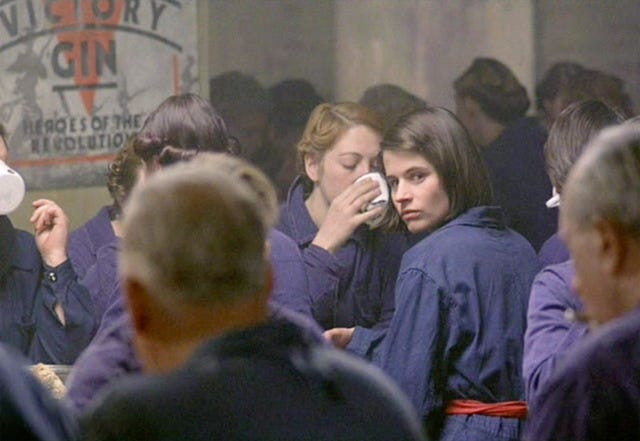Julia from 1984 is problematic: and that’s fantastic
Literature is art, art exists to be discussed

The first time I read 1984, I was outraged. For all the wrong reasons, in a traditional fourteen year old manner. How could Winston, the hero, think about raping and murdering Julia? Doubleplusungood. Of course, this is verbal territory I now fight for.
Winston isn’t good. The whole point of Winston is that he is a man. A normal, forty something year old man, who thinks and says ungood things. That’s the Winston dilemma. In this sense, protagonist is a better description than hero.
I am no longer appalled by the creation of a character who contemplates rape. In fact, I am pleased, even impressed, that Orwell had the guts to say the unsayable and provoke a discussion about the masculine subconscious.
Besides, it got me thinking. Is this how men are? Or is this what sexual frustration and internalised anger does to a human? There is no such thing as a flawless hero. Why should we pretend it is so in our books? I don’t like Winston. But I believe in him far more than Eragon or Prince Charming. Because he’s marvelously flawed. Full marks, Orwell.
So why is Julia so wrong, next to a character who is so right? I found her funny at 14 and even more so now. She’s the ultimate male fantasy. Pretty, young, subversive (although discreetly) sexually available and totally unexplained.
Why does pretty clever could fuck anyone Julia like Winston, boring middle aged middle manager? Meh. Because Orwell liked to imagine pretty young women just would. Why does Julia search for older, meek, sexually frustrated sexual partners? Fuck it, why explain, girls don’t need real, complex motives. Orwell spends more time discussing her body and how she has sex than her motives or past. Clever literary device to underline Winston’s repressed narrative?
I’m going to say nah.
She’s so 2D, so doll like, so bland. She inexplicably falls in love with a man who is impressively uninteresting. A feat. Or fantasy?
Granted, it was 1948 and Georgie probably didn’t sit down to his typewriter thinking “Ooh let’s explore the female phenomenological experience in a humanising manner” but even The Wide Sargasso Sea (A book where a woman submits to the racial and gendered subjugation of colonial British society) isn’t this shit at presenting a viable motive for the heroine’s actions.
Anyway. Flaws, Julia and all- I am aware I am committing heresy for criticising a literary God here- I like 1984. It brings up discussion, disagreement and reflection.
Isn’t that why we read?
